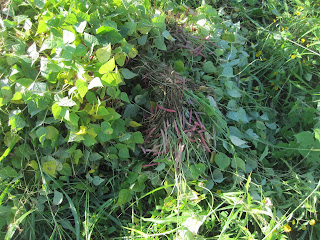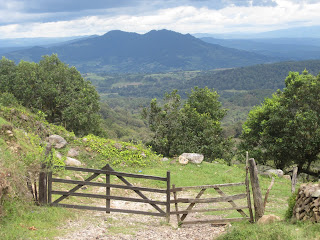Last Thursday, I was planning on writing a day-in-the-life blog post about my day, since it had been fairly ridiculous (and therefore completely normal for a day in Nicaragua). As you may recall from my last blog post, however, Thursday ended with our dog almost dying, and that was just a whole new level of ridiculous and thwarted my blog post plans. But alas, Thursdays seem to be good days around here, so I'm going to try it again: a day in my life.
7:15AM: Wake up (before my alarm?? That's a new one.) Walk out of my bedroom into the office to finish making a worksheet for my adult English class - past tense review, and some new vocabulary.
7:45AM: Fight with the copier (really, copier, two paper jams within 20 copies?) to copy my worksheets for my English class.
8:00AM: Eat deliciously unhealthy French toast that our cook, Elena, made for breakfast. We have a cook Monday through Thursday to allow us to focus on programs during our four busy days of the week. She's awesome and takes fantastic care of us.
8:15AM: Take care of some logistics for our child sponsorship program - we have 5 new children who will be entering the program this month, which is exciting!! Two of them are younger siblings of kids who just graduated from the program, and the other three are new families to our program. I'm very excited that we can expand our reach in Chureca slightly.
9:00AM: Pile into our micro (15 passenger van) to head to Chureca. Recently, instead of driving into the dump, we've been parking near the back entrance and walking in - less wear and tear on the micro, and less stress for whoever is driving.
9:45AM: Once we arrived at the clinic in Chureca, I checked in with Esmo, the Nicaraguan nurse who works with us, about the new kids who will be entering the program. Then Carrie, Maggie, and I walked around to visit families and check in with them. We often have mothers from the program who will walk around with us, and yesterday Laura, the mother of the boy I sponsor, was walking around with us. I really enjoyed getting the chance to talk to her, and learn more about Alfredo and his family. We also had some good visits with families in the program. When we first started walking around Chureca and visiting, I was doubting how effective it was, but as we've started to get to know the mothers better, I'm recognizing the value in it.
11:00AM: Head back to the house. On the way, pass a dog carrying a full zucchini in its mouth - clearly the dog was the winner of the day.
11:40AM: Arrive back at house, eat a quick lunch, and get ready for the afternoon. Elena had made a cake as well! When asked what the cake was for (thinking that there was perhaps a special occasion, since we don't often have cakes), she responded that the cake was for eating. Duh, I don't know why we didn't think of that one ourselves.
12:15PM: Jump back into the micro, drive down the road, and then walk down the dirt road to El Farito, where we help run a feeding program on Tuesdays and Thursdays. It was actually a pretty normal, low-stress Comedor day today - almost all the kids who signed up to help clean actually stayed to clean, no one threw any toothbrushes on the ground, and I didn't have to tell people to be outside the gate tooooo many times. Impressively normal, since Comedor has the potential to be quite a headache if the kids are in crazy moods.
1:15PM: Get handed an "ice cream" (small frozen deliciousness which is more like a popsicle than an ice cream) by one of the cutest five year olds ever. The store right next to El Farito sells these ice creams, which come in small plastic baggies and you bite a hole in the bag to eat the ice cream. The one Brandon gave me was a flavor I had never had before, but it was pretty delicious. My favorite ice cream flavor is passion fruit, but that one hasn't been around in a few days - there are plenty of delicious options though!
1:30PM: Time for kid's English! Christin and I let the kids back inside the gate to Farito, and start passing out the kids' notebooks and pencils. All of a sudden, Farito is REALLY full. We had 54 kids come to our English class!! We're not quite sure where they all came from, and it made for a bit of a crazy class, but I found it pretty fun actually. I also found it exciting that all of them wanted to come to class! By the time class is over at 2:30, my throat is slightly sore from shouting to get 54 kids to be quiet. Also, kids here LOVE to steal pencils, particularly those with erasers. I'm not quite sure what the appeal is, but it's quite annoying.
2:30PM: Clean up from English, take a few minutes to sit and enjoy silence, and walk back to the car to head home with Carrie to prep for the rest of the day. On the drive home, we realized that the gate to the neighborhood, which had been broken off for the past two days, was back in place! Then we had to wait for the guard to open the neighborhood gate since he was taking a bathroom break (outside in the bushes right near the gate)....slightly awkward.
3:00PM: Try to catch up on e-mails and Facebook messages - I seem to get behind on those very easily nowadays, but catch up at least once a week. Sorry to anyone who has been waiting on a response from me...I'm working on it, I promise!
3:40 PM: Head back to Farito to get ready for women's exercise. I don't teach women's exercise, but I help out by playing with kids while their moms attend the class. At yesterday's class, I also helped out by measuring the height of all of the women for a BMI calculation. After that, I played with Duplos with some pretty cute three year olds, chatted with one of my kids English students, and just hung out with the kids. Three of the girls, who are around 6, danced along with the women as they did Zumba to a variety of popular Latin American music - adorable and hilarious at the same time. :)
5:00 PM: Re-arrange the tables in Farito again so that they're ready for my adult English class.
5:30 PM: Sam and I co-teach adult beginner's English. We reviewed past tense, introduced some new vocabulary, and did a worksheet incorporating both of those things. While Sam was teaching the vocabulary, I confiscated a note from some of the teenagers in the class - there seems to be a bit of a love triangle going on at one of the tables of my English class. Also, it was the second note I confiscated this week, and both were passed when I was literally within 3 feet of the person passing it. Solid work, students, solid work.
6:30PM: Walk back down the now-dark dirt road to the car and head home. Eat some dinner, do some dishes, and then head up to the roof to play guitar and hang out with Dayana, one of my friends here who lives in the community. I often will go to advanced English class in the evening to help out, but about 5 PDs went last night so I took the night off. It was nice to just spend the evening relaxing!
10:00PM: Drive Dayana home, and come back to the house and hang out and talk with people for the evening. One of the great things about working with Manna is that all 9 of us PDs live together, and I have really enjoyed getting to know everybody in the group and spending time hanging out with them. During the week we all get busy and don't have a ton of time to just sit around, but it's great to find time to do that on Thursdays or on the weekend.
12:00AM: Realize it's definitely past my bedtime and I'm falling asleep sitting up, and head to bed.
In writing this, I have realized that it's actually impossible to express some of the ridiculousness of life here. It's often not that any one ridiculous things happens, it's just a bunch of small things throughout the day which keep life interesting, enjoyable, and hilarious. Maybe throughout the year I'll get better at explaining them - but for now, I hope this gave you at least a little glimpse into what I do here on a "normal" day. My Tuesdays and Thursdays look pretty similar - Mondays and Wednesdays are a separate beast. I'll do a day-in-the-life for Monday or Wednesday next week, and then between the two, you'll have a good feel of my work week here!
























